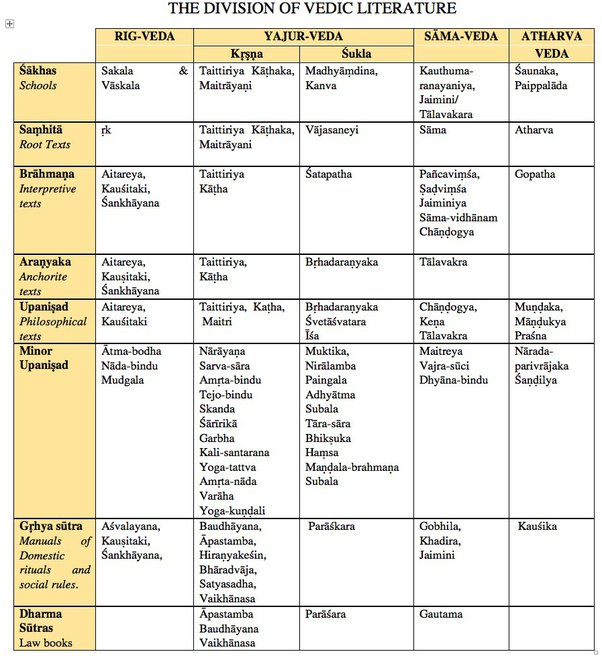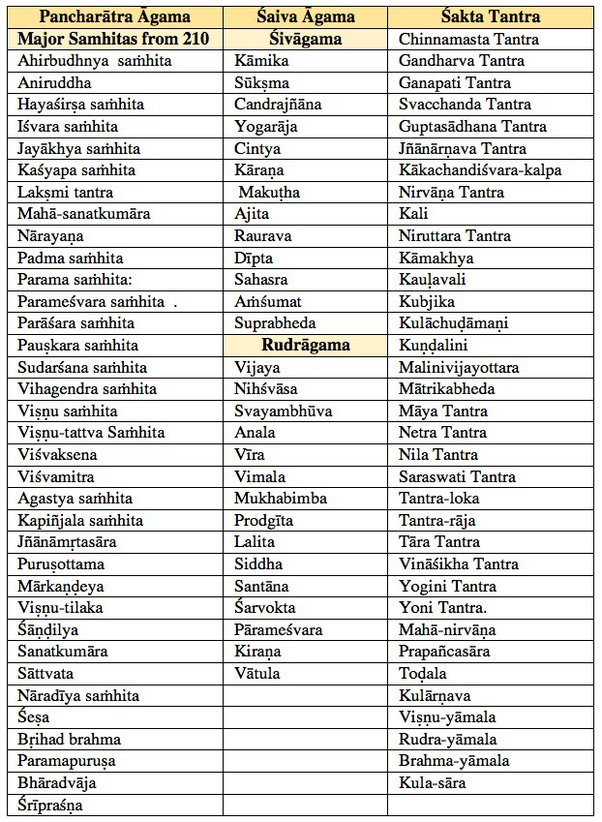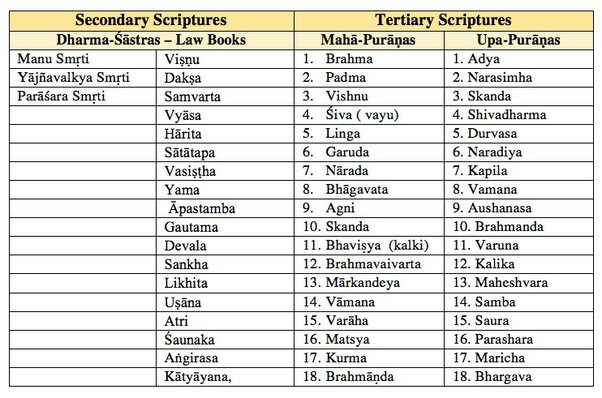Hindu Culture
Hindus subscribe to a diversity of ideas on spirituality and traditions, but have no ecclesiastical order, no unquestionable religious authorities, no governing body, no prophet(s) nor any binding holy book; Hindus can choose to be polytheistic, pantheistic, monotheistic, monistic, agnostic, atheistic or humanist.
Types of Hinduism
- Folk Hinduism, based on local traditions and cults of local deities prior to the Vedic Age
- Shrauta or Vedic ritual-oriented Hinduism as practised by Traditionalist Brahmins
- Vedantic Hinduism, including Advaita Vedanta (Smartism), based on the philosophical approach of the Upanishads
- Yogic Hinduism, especially the sect based on the Yoga Sutras of Patanjali
- "Dharmic" Hinduism or "Daily Morality", based on Karma and upon societal norms such as Vivaaha (Hindu marriage customs)
- Bhakti or Devotional practices
Table of Contents
- Types
- Ideas
- Sampradaayas
- Scriptures
- Books
- Caste Divisions
- Types of Marriages
- Outline
- Concepts
- Purusarthas (Goals of Life)
- Neeti (Ethics)
- Schools (Astika/Nastika)
- Vedas / Divisions
- Upa Vedas
- Vedanga
- Other Books
- Sangam Literature
- Deities (Gods, Goddesses)
- Practices
- Varnaashramaas
- Samskaaras
- Festivals
- Other Concepts (idk what)
- Related
- Gunas (Qualities)
Ideas
Para Brahmaan is beyond all descriptions and conceptualizations. It is formless (devoid of Maya) and is eternal.
Nirguna - No attributes
Saguna - All good attributes
- In Advaita Vedanta
- Para Brahmaan = Nirguna Brahmaan (no attributes)
- In Dvaita Vedanta
- Para Brahmaan = Saguna Brahmaan (All good attributes)
- In Vishista Dvatia Vedanta
- Para Brahmaan = Saguna Brahmaan (All good attributes)
- By Bhakti Traditions (Vishnu Worship, Paramashiva Worship, Adiparashakti Worship, Ganapati Worship, Kartikeya Worship)
- Vishnu, Shiva, Adi Shakti, Mahaganapati, Kartikeya are respectively considered Para Brahmaan
Hindu denominations / Sampradayas
- Bhakti Traditions
- Paramashiva Worship
- Vishnu Worship
- Adiparashakti Worship
- Ganapati Worship
- Kartikeya Worship
- Advaita Vedanta (No Worship)
- Smartism (Advaita Vedanta + Bhakti tradition)
- Worship of 5 dieties in a quincuix pattern, with Ganesha, Shiva, Vishnu, Devi/Durga, Surya and optionally one Ishta Devata in the middle
Scriptures
- Srutis (eternal words)
- Vedas (Rig Veda, Yajur Veda, Sama Veda, Atharva Veda) / Nigama (Abstract Ideas)
- Sections: Samhitha, Brahmana, Aranyaka, Upanishad
- Vedangas / Supplimentaries: (Shiksha, Chandas, Vyakarana, Nirukta, Kalpa, Jyotisha)
- Vedas (Rig Veda, Yajur Veda, Sama Veda, Atharva Veda) / Nigama (Abstract Ideas)
- Smritis (human works)
- Ithihasas (Mahabharatam, Ramayanam)
- Bhagavad Gita is a part of Mahabharatam
- Puranas
- Puranas / Maha Puranas (Great Legends) (18 in number)
- Upa Puranas (Minor Legends) (18 in Number)
- Bhagavata Purana / Sreemad Bhagavatam was the last Purana written by Ved Vyas
- It begins where Bhagavad Gita ends, and most important Purana
-
Tantras / Aagamas (Practical Ideas)
-
Sections: Jnana Pada / Vidya Pada, Yoga Pada, Kriya Pada, Charya Pada
- Jnaana pada / Vidya Pada – consists of doctrine, the philosophical and spiritual knowledge, knowledge of reality and liberation
- Yoga Pada – precepts on yoga, the physical and mental discipline.
- Kriya Pada – consists of rules for rituals, construction of temples (Mandir); design principles for sculpting, carving, and consecration of idols of deities for worship in temples; for different forms of initiations or diksha.
- This code is analogous to those in Puranas and in the Buddhist text of Sadhanamala.
- Charya Pada – lays down rules of conduct, of worship (puja), observances of religious rites, rituals, festivals and prayaschitthas.
-
Aastya (Orthodox Hindu schools of philosophy)
- Shad Darshan / 6 Darshans (Samkhya, Yoga, Nyaya, Vaisheshika, Mimamsa and Vedanta)
- Naastya (Hindu schools of philosophy not accepting of Vedic authority)
- Sangam Literature
- Five Great Epics (includes Silappatikaram)
-
- Ithihasas (Mahabharatam, Ramayanam)



Books
- Lalita Sahasranamam (from Brahmaanda Purana)
- Saundarya Lahari (Tantra text)
- Devi Mahatmyam (from Markandeya Purana)
Caste Divisions / Chatur Varnas
- Brahmins
- Kshathriyas
- Vaishyas
- Shudras
- Untouchables (Casteless)
The religious theory states that according to the Rig Veda (ancient Hindu book) the Adipurush (primal man) destroyed himself to create a society where the different parts of his body represented the four Varnas. Brahmins came from his head, Kshatriyas came from his hands, Vaishyas came from his thighs, and Sudras came from his feet.
Eight Types of Marriages
Hindu texts such as the Atharvaveda and the Manusmriti III.20-34, identify eight forms of marriage. They are traditionally presented, as here, in order of their religious appropriateness (prashasta).
These are in the order of superiority.
- Brahma Vivaha: According to Dharma Sindhu, Yogya Vadhu-Varu Vivaha is termed as Brahama Vivaha. The bride and groom belong to the same varna. Groom follows the Brahmacharya, Grihastha, Vanaprastha and Sanyasa Ashrams according to the laws of Dharma. The groom's father approaches the girls family and requests the bride's father for his consent to give her as a gift (Kanyadaan). This is considered as the best type of marriage.
- Daiva Vivaha: In this type of marriage, the father of the bride after having waited long for a marriage proposal for his daughter, goes in search of a right groom and gifts his daughter to a righteous Ritvik (priest) who officiates a Yajna if the latter is willing to accept her as a wife.
- Arsha Vivaha: In this type of marriage, the father of the bride offers his daughter to a Rishi or a sage who leads an austere life. The wife accompanies the sage in his austerities and penance. According to Srimad Bhagavatha, Manu performed Arsha Vivaha of his daughter Devahuti to sage Kardama, who later begot Kapila, an avatar of Vishnu.
- Prajapatya Vivaha: In this type of marriage, Bride's father goes in search for the groom. After marriage, the bride lives with the husband through the stages of Grihasthya and Vanaprastha and the husband should not take to Sanyasa. Emphasis is laid on continuing the family lineage by begetting sons and daughters. Most of the arranged marriages that we witness today belong to this category.
- Gandharva Vivaha: A love marriage, in which the bride and groom get married based on mutual consent without any other considerations. This is considered inferior than the above forms of marriages, as having sex is seen as the sole goal.
- Asura Vivaha: In this type of marriage, lack of consent from either sides, is replaced by compensation with money or in the form of dowry or gift. This type of marriage is like a business transaction. Mostly, the groom is not suitable for the girl and might offer a huge sum of money as a compensation.
- Rakshasa Vivaha: Groom has the bride's consent but not the consent of the girl's family. To marry a woman by abduction or by eloping, against the wishes of the parent is Rakshasa Vivaha. The groom may also win over the bride's family in a battleground.
- Counter to inclusion of eloping (From Wikipedia):
- "This form of a marriage is different from answering the marriage proposal of a bride, and eloping with her during her Svayamvara, the ancient Indian ceremony where a bride chooses her groom from an approved assembly of suitors. For instance, in Hindu mythology, when the deity Krishna elopes with the princess Rukmini during her Svayamvara, it is not a form of Rakshasa marriage; while he does take her away in his chariot and fights her attacking family members, she had sought to marry him, and hence consent was present."
- Counter to inclusion of eloping (From Wikipedia):
- Paisachika Vivah: This is considered as the most inferior type of marriage as the bride is taken away by force as a wife. In this type of marriage, neither the girl's consent nor the family's consent is honored.
Wikipedia Table
- Concepts
- Purusarthas
- Niti
- Schools (Astika/Nastika)
- Vedas / Divisions
- Upa Vedas
- Vedanga
- Other Books
- Sangam Literature
- Deities (Gods, Godesses)
- Practices
- Varnashramas
- Sanskaras
- Festivals
- Other Concepts (idk what)
- Related
Gunas (Attributes)
Dharmas (Morals)
Sanskaras (Cultural Traditions)
Poojas (Worship Rituals)
Concepts of God (Maya, Jiva, Aatmaan, Param Aatmaan, Prakriti, Brahmaan, etc.)
-
Concepts
- Brahmaan (The Universe)
- Om (The Initial Sound)
- Eeshvara (God)
- Aatmaan (The Soul)
- Maaya (The World)
- Karma (Actions)
- Samsaara (Cyclic Existence)
- Kaala Chakra (The Cycle of Samsaara)
-
Puruṣārthas
- Dharma (Morality)
- Artha (Meaning)
- Kaama (Eroticism)
- Moksha (Liberation)
-
Neeti (Ethics)
- Ahimsa (Non-Violence)
- Asteya
- Aparigraha
- Brahmacharya (Celibacy)
- Satya (Honesty)
- Daana (Benovelence)
- Daamah
- Daya (Kindness)
- Akrodha (Anger-Free)
-
Schools / Darshans
- Aastika (Follows Vedas)
- Samkhya
- Yoga
- Nyaya
- Vaisheshika
- Meemaamsa
- Vedanta / Uttara Meemaamsa
- Dvaita
- Advaita
- Vishishtadvaita
- Naastika (Doesn't Follow Vedas)
- Buddhism
- Jainism
- Chaarvaka
- Aajeevika
- Ajnaana
- Aastika (Follows Vedas)
-
Texts
- Classification
- Shruti
- Smriti
- Classification
-
Upa Vedas
- Ayurveda
- Dhanurveda
- Natyaveda
- Sthapatyaveda
-
Vedanga
- Shiksha
- Chandas
- Vyaakarana
- Nirukta
- Kalpa
- Jyotisha
Smritis (Inspired Works)
- Aagamas
- Itihasas (Epics)
- Ramayana
- Mahabharata
- Bhagavad Gita
- Puraanaas
- Minor Upanishads
- Artha Shaastra
- Nitisara
- Dharma Shaastra
- Manusmriti
- Naaradasmṛti
- Yajnavalkya Smriti
- Sutras
- Yoga Sutras of Patanjali
- Stotras
- Subhashita
- Tantras
- Astika
- Nastika
-
Literary Works
- Yoga Vasistha
-
Sangam Literature
- Tirumurai
- Divya Prabandham
- Tirumurukāṟṟuppaṭai
- Thiruppugal
- Thirukkural
- Kamba Ramayanam
- Five Great Epics
- Eighteen Greater Texts
- Eighteen Lesser Texts
- Athichudi
- Iraiyanar Akapporul
- Abhirami Antati
- Thiruvilaiyadal Puranam
- Vinayagar Agaval
- Vedarthasamgraha
Deities
Gods
Trimurtis: Brahma, Vishnu, Shiva
Others: Agni (Fire), Dattatreya, Ganesha, Hanuman, Indra (Lord of Heavens), Kartikeya, Krishna, Rama, Surya (Sun), Varuna, Vayu (Wind), etc.
Goddesses
Tridevis: Saraswati, Lakshmi, Parvati
Others: Bhumi (Earth), Durga, Kali, Mahavidya, Matrika, Radha, Rukmini, Sati, Shakti, Shashthi, Sita, etc.
Worship
Places: Temple
Tools: Murti (Idol / Vessel)
Rituals: Puja (Devotional Ritual), Japa (Recitation), Bhajan (Devotional Songs), Keertana (Descriptions), Naivedhya (Food Offerings), Prasaada (Returned Offering), Homa (Fire Rituals with Votary (Thrown) Offerings), Yajna (Large Fire Rituals), Tapas (Intense Meditation), Dhyana (Meditation), Tirthatana (Pilgrimage)
Devotion: Bhakti
Sanskaras (Culture / Rituals)
- Garbhadhana
- Pumsavana
- Simantonayana
- Jatakarma
- Namakarana
- Nishkramana
- Annaprashana
- Chudakarana
- Karnavedha
- Vidyarambha
- Upanayana
- Keshanta
- Ritushuddhi
- Samavartanam
- Vivaaha
- Antyeshti
Varnaashrama
It refers to Varnas and Ashramas
Varnaas
- Brahmin (Priest)
- Kshatriya (Warrior)
- Vaishya (Businessmen)
- Shoodra (Worker)
Aashramaas
- Brahmacharya
- Grihastha
- Vanaprastha
-
Sannyasa
-
Festivals
- Diwali
- Holi
- Shivaratri
- Raksha Bandhan
- Navaratri
- Durga Puja
- Ramlila
- Vijayadashami
- Ganesh Chaturthi
- Rama Navami
- Janmashtami
- Onam
- Pongal
- Makar
- Sankranti
- New Year
- Bihu
- Gudi Padwa
- Pahela Baishakh
- Puthandu
- Vaisakhi
- Vishu
- Ugadi
- Kumbh Mela
- Haridwar
- Nashik
- Prayag
- Ujjain
- Ratha Yatra
- Teej
- Vasant Panchami
- for Others
-
Other
- Svaadhyaaya
- Namaste
- Bindi
- Tilaka
-
Related
- Hindus
- Etymology
- List
- Denominations
- Law
- Calendar
- Anti-Hindu sentiment
- Criticism
- Hindu gurus and sants
- Hindu studies
- Iconography
- Mythology
- Nationalism
- Hindutva
- Persecution
- Pilgrimage sites
- India
- Relations with other religions
- Bahaʼi
- Buddhism
- Islam
- Jainism
- Judaism
- Sikhism
- Theosophy
- Glossary
- Hinduism by country
- Hindu temples
- List
- Architecture
- Hindus